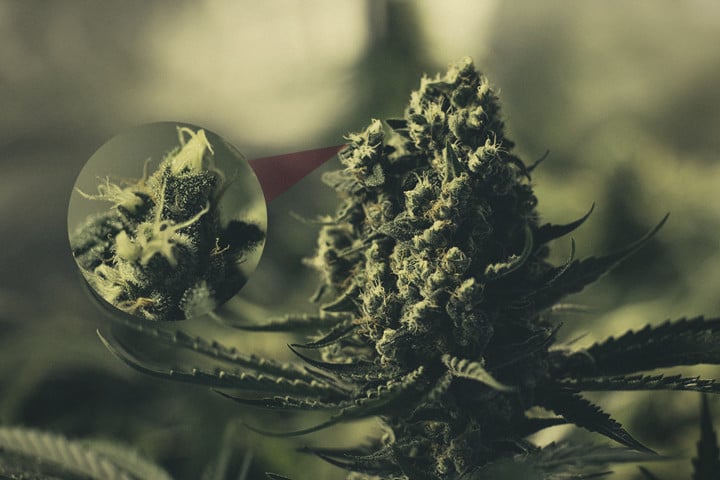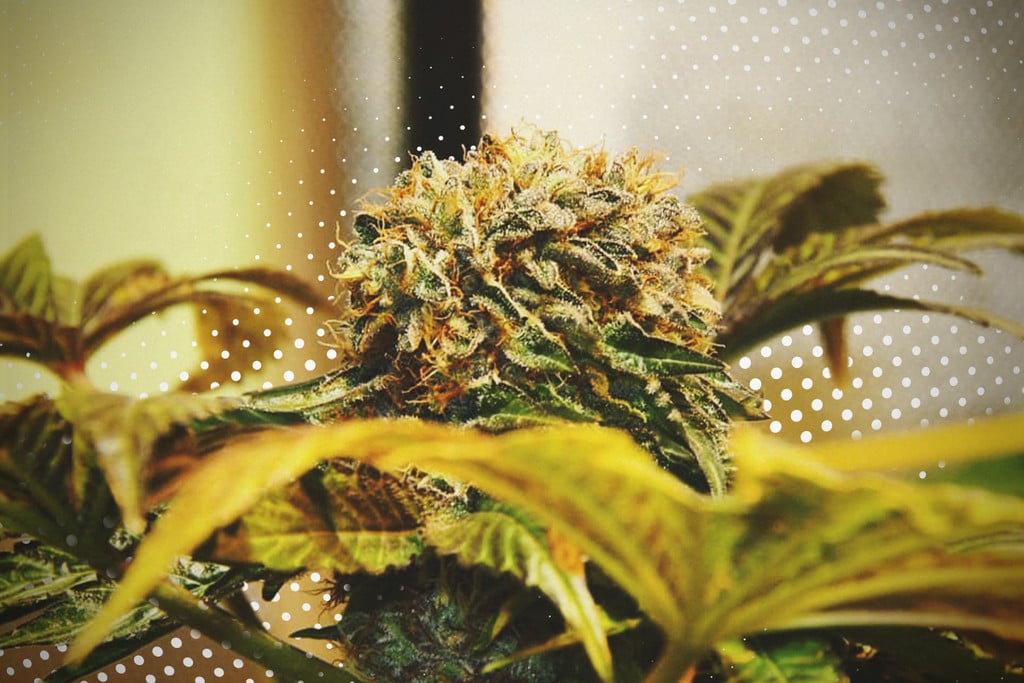.
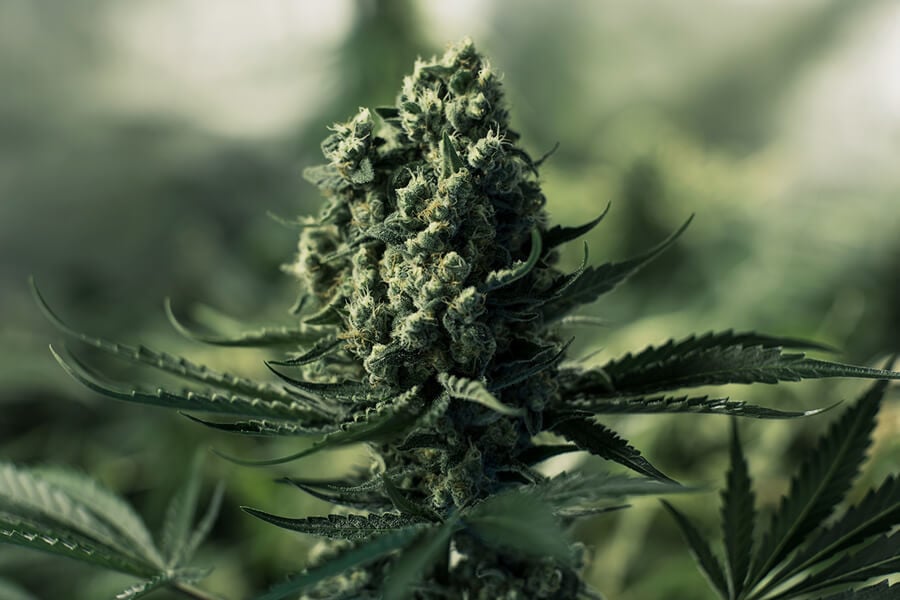
Understanding Triploid and Tetraploid Cannabis Plants
Autoflowering cultivars make growing weed easier; feminised strains erase the need to identify plant sex; F1 hybrids offer growers unparalleled uniformity. Are polyploids the next frontier in weed industry innovation? These plants grow bigger and produce larger flowers with more trichomes. Find out all you need to know about polyploids here.
Most cannabis varieties are made up of cells that contain two sets of chromosomes—two from each parent. However, pioneering breeders have created varieties that contain three or even four sets. Why does this matter? Because these plants produce bigger buds, more cannabinoids and terpenes, and larger overall yields. Discover everything you need to know about polyploid weed and how it could steer the future of the industry.
Contents:
Diploids: The Standard Cannabis Genome
Much like us humans, most cannabis plants are diploid organisms—they contain two sets of chromosomes in each cell (“di” means “two”). In case you don’t remember much from biology class, chromosomes are small structures built from nucleic acids found in the nucleus of the cell. They store genetic information and enable the copying of DNA during cell division, also known as mitosis.
Each parent plant passes down 10 chromosomes to the offspring, meaning diploid cannabis plant cells possess a total of 20 chromosomes. Researchers believe that diploidy offers organisms somewhat of a survival advantage[1]. Not only does having two sets of chromosomes mean cells have a software backup if one chromosome gets damaged, but it allows healthy genes to override those with detrimental mutations.
Diploidy also offers other benefits. The presence of two sets of chromosomes allows plants to adapt better to their surroundings over time. Inherited sets of genes from both parents also equip plants with genetic variability, increasing the odds of inherited pest and disease resistance and other desirable traits.
The vast majority of cannabis cultivars are diploid in nature. Only a very small percentage of naturally occurring cannabis plants emerge with more than two sets of chromosomes. However, cannabis breeders have developed methods to create plants with three or even four sets of chromosomes. Known as polyploidy, this trait comes with some superb advantages, as well as some downsides.
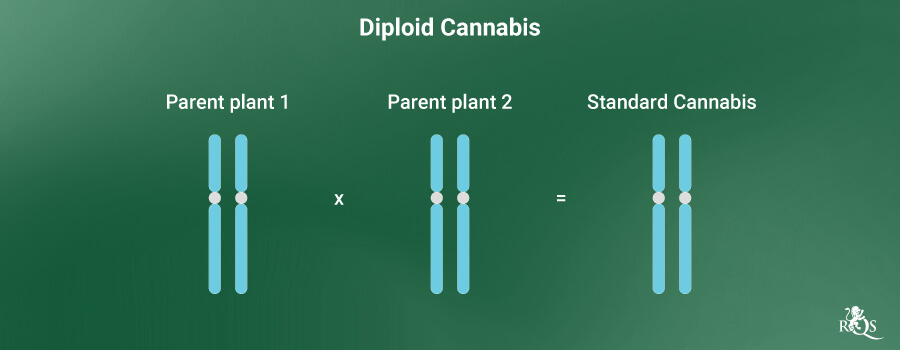
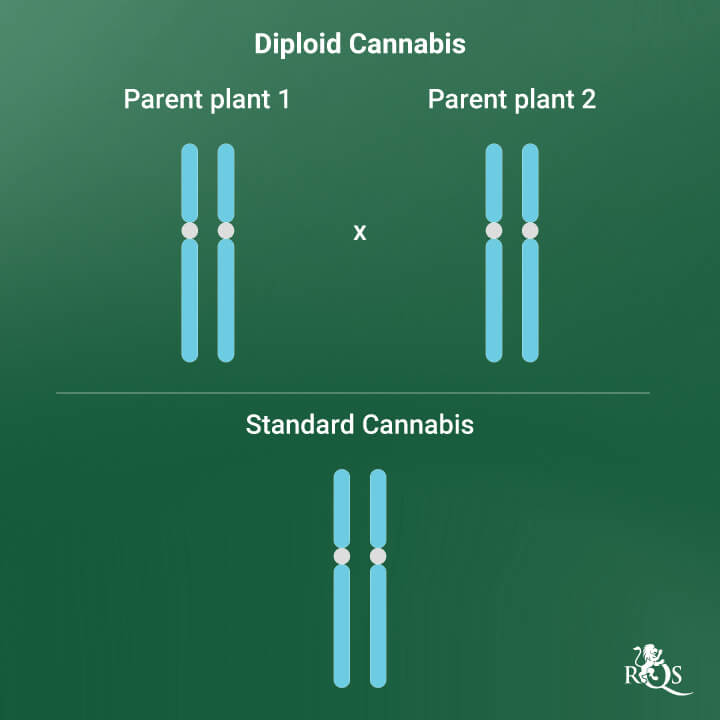
Overview of Polyploidy in Cannabis Plants
Polyploidy occurs in almost all flowering plants[2] to varying degrees. Many of the agricultural crops that have become staples in the human diet are polyploids, including strawberries, coffee, potato, and oats. Cannabis breeders have figured out ways to increase the number of chromosome sets within cannabis cells, using both chemical intervention and crossbreeding between diploid and polyploid varieties.
Polyploid cannabis varieties differ from their diploid counterparts in several ways, including:
- Cell wall composition: Research shows that polyploidy changes the composition[3] of the cell wall—the structure that surrounds the plasma membrane. These changes influence the levels of proteins and complex carbohydrates in the cell wall, which can have a big influence on drought tolerance and pathogen defence.
- Biomass production: Polyploid hemp produces more biomass and heavier flowers[4]. This has important implications in commercial agriculture for both industrial hemp and medicinal and recreational cannabis.
- Less fertile: Polyploids are often infertile[5]. This might sound like a disadvantage, but it actually comes in handy when growing seedless weed flowers.
Types of Polyploidy in Marijuana
In case you haven’t noticed, the cannabis market has exploded over the past decade. As legalization continues to blossom, research and development efforts are ramping up. Companies are pouring considerable time, effort, and money into creating cannabis plants/products that increase profits and better satisfy customer demands. So far, breeders have created cultivars with higher levels of THC, bigger buds, higher yields, and more flavour.
Now, researchers are honing in on the concept of polyploidy to improve cannabis as an agricultural crop. Through chemical treatments and crossbreeding, the following types of cannabis polyploids have arisen:
- Triploid cannabis: As the name suggests, triploid cannabis contains three sets of chromosomes[6], which adds up to 30 in total. The offspring inherit a single set from one parent and two from the other.
- Tetraploid cannabis: These cultivars possess four sets of chromosomes, two from each parent. Although tetraploid plants possess more copies of DNA, they’re a precursor to triploid plants during the breeding process (more on this below).
.jpg)
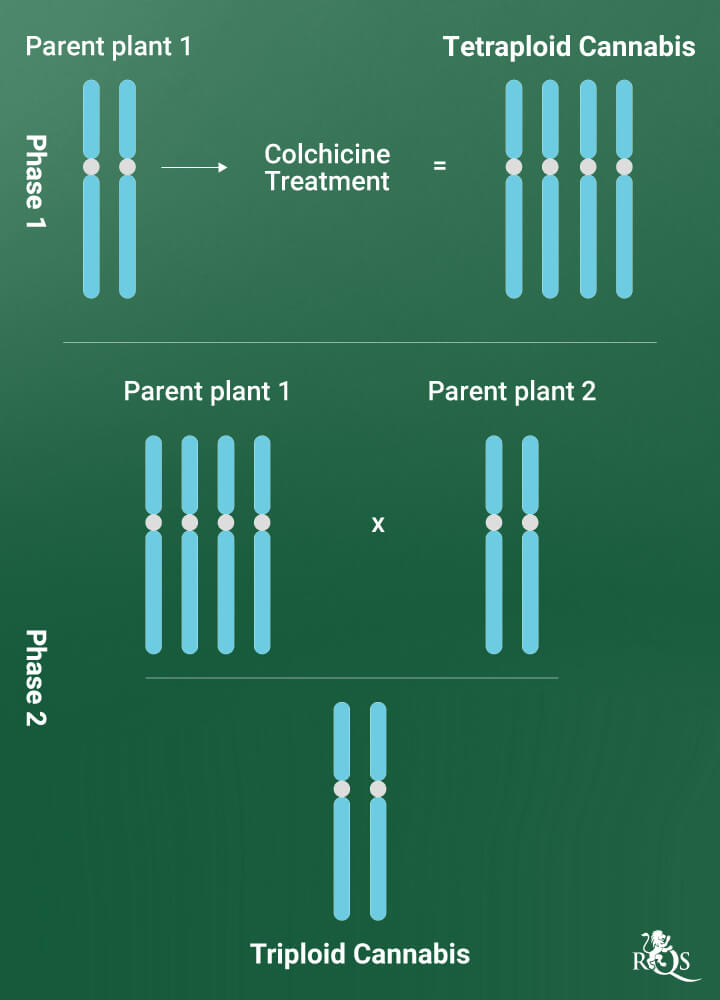
Can Cannabis Polyploidy Solve the Pollen Problem?
Polyploid cannabis plants offer a host of benefits, and they may help growers overcome the fertilisation issue when it comes to cultivating cannabis on a large scale. You see, as a dioecious plant, cannabis emerges from seed as either a distinct male or female specimen. The females produce resinous flowers high in cannabinoids and terpenes (if left unfertilised), whereas the male flowers produce pollen.
Overall, male plants are relatively worthless when it comes to crop production. Not only that, but they decrease the quality of female flowers upon fertilisation, turning them from sweet sinsemilla into seedy and less potent buds.
The current industry[7] standard for dealing with this issue involves genetic testing before transplanting. As you can imagine, this quickly becomes costly and time-consuming. However, both feminised seeds and cloning offer an alternative solution. Polyploid cannabis could become another option for commercial and small-scale growers looking to produce seedless weed.
Triploid cannabis varieties are practically infertile and rarely produce seeds, regardless of whether they are surrounded by pollen-producing males. Their odd sets of chromosomes impair the cellular processes that lead to seed development.
Triploid Cannabis Plants
Triploid plants are not exclusive to the world of cannabis breeding. Horticulturalists have developed triploid varieties across a host of different species to reap their benefits. For example, seedless fruit, such as watermelons and bananas, are triploid. Because they can’t produce seeds, they’re more convenient to consume and therefore more appealing to consumers.
Much like other triploid crops, cannabis strains that possess three sets of chromosomes also offer key benefits. They create more biomass in terms of leaves and stems, which makes them more valuable in some commercial settings. Larger flowers also make them extremely appealing to growers, as well as customers seeking big buds in dispensaries and other retail outlets.
How Do Triploid Cannabis Plants Occur?
Triploid plants do occur naturally, but they are extremely rare. In order to create them, breeders need to first create tetraploid weed cultivars (we’ll discuss this process below). Once they secure tetraploid genetics, breeders then need to select suitable diploid specimens with desirable traits. Crossing a carefully selected tetraploid parent with a diploid parent will create triploid offspring.
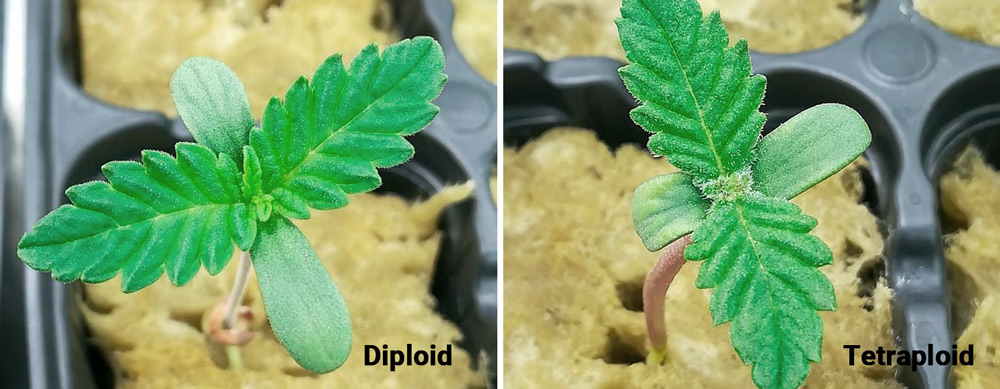
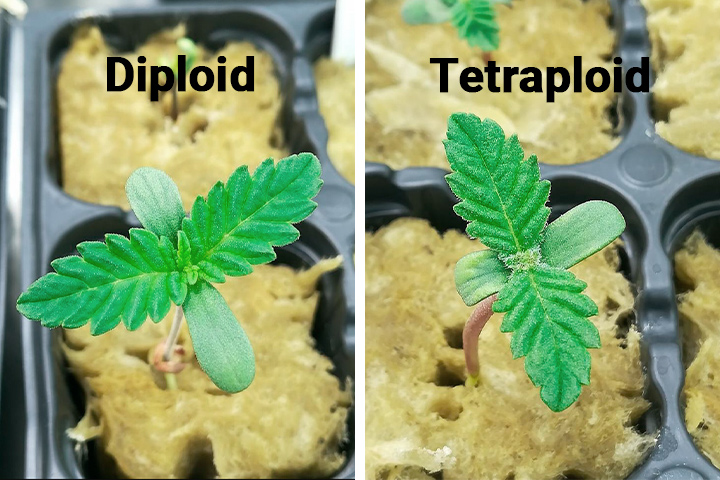
Traits of Triploid Weed Genetics
Now you’re aware of how triploid and diploid plants differ genetically, but how exactly are these differences expressed? The key differences exhibited by triploid plants include:
- Larger and more luscious: Research shows that triploid cannabis plants tend to grow larger[8] than their diploid counterparts. An overall increase in biomass makes for bigger fan leaves, longer stems, and a more extensive root network in the soil.
- Slower to grow: The size and productivity of triploid plants come with a trade-off—they take longer to grow. While not a problem for hobbyists, the length of the growing cycle poses an issue for commercial ventures that value a quick turnaround.
- More cannabinoids: Studies analysing the chemical qualities of diploid and polyploid weed strains have found higher levels of cannabinoids[9] in triploid varieties.
- Bigger buds: Triploid cannabis varieties also produce bigger flowers. The buds are longer, wider, and denser. Larger buds and more cannabinoids make for dramatically larger yields per plant.
What Are the Benefits of Triploid Cannabis Plants for Breeders?
Triploid cannabis opens up a whole new field of play for breeders. Just like the advent of autoflowering and feminised genetics, a rise in triploid plants could change the cannabis industry in many ways. Contemporary research has found that these varieties certainly show promise. However, this innovation is still in the early stages, and triploid weed plants also have some downsides that could affect their adoption among breeders and growers, both commercial and amateur.
Can You Cross Triploid and Diploid Cannabis Plants?
Technically, yes. A breeder could cross diploid and triploid parent strains. However, the results probably wouldn’t be worth the effort, as their unequal amount of chromosome sets can disrupt the normal reproductive process. On top of that, triploids are almost always sterile, meaning there’s only a very tiny chance that they’ll go to seed to produce offspring.
What Are the Downsides of Triploid Genetics for Growers
Triploid cannabis plants certainly boast some impressive benefits. They offer a seedless crop, bigger yields, large buds, and more cannabinoids. However, these cultivars largely remain confined to research laboratories for the time being. Plus, they also have some downsides. Their incredibly low fertility means that growers will have to indefinitely maintain a line of clones in order to maintain a progeny that they like. Inevitably, this demands resources such as space, lighting, and nutrients.
On top of this, triploid varieties are hard to create. They require knowledge of plant genetics and the ability to create tetraploid strains as parent stock. Realistically, the vast majority of small-scale growers lack the resources and knowledge to make their own triploid genetics.
Tetraploid Cannabis Plants
Tetraploid cannabis plants are similar to triploids in the sense that they are also polyploids. However, instead of three sets of chromosomes, each cell possesses four—two sets from each parent. These varieties are somewhat easier to create than triploid ones; you can view them as a botanical precursor.
How Are Tetraploid Weed Plants Formed?
Plant scientists create tetraploid plants through chemical intervention. There are several molecules that, when applied to a weed plant, cause cells to multiply their chromosomes. These compounds include colchicine[10], a naturally occurring chemical found in autumn crocus that interferes with cell division. Researchers also use oryzalin, a less toxic alternative, to achieve the same result.
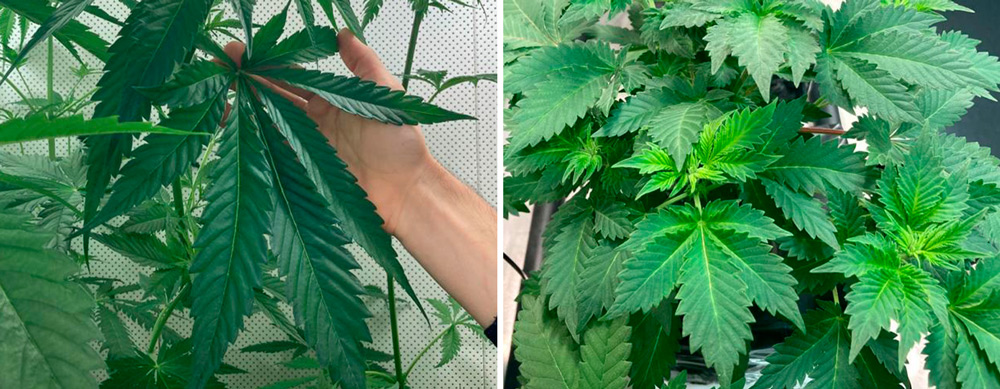
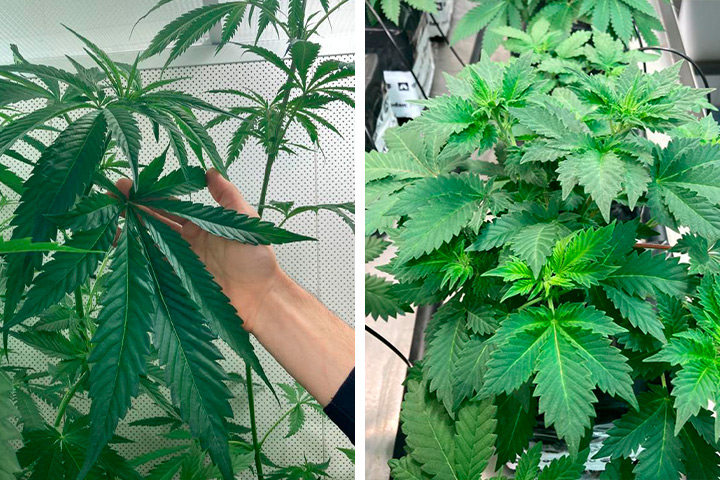
Traits of Tetraploid Genetics
Tetraploid cannabis varieties also possess unique traits that make them attractive to breeders and growers. These qualities include:
- Unique leaf morphology: Tetraploid varieties have different leaves compared to their diploid cousins. Their fan leaves are larger[11] with longer and thicker leaflets. The guard cells that open and close the stomata are also thicker and longer.
- Greater trichome density: Trichomes are the small glands found on bud and leaf surfaces. These crystal-like structures are responsible for creating cannabinoids and terpenes—the chemicals responsible for the effects of each strain. Studies show that tetraploid sugar leaves produce around 40% more trichomes[12] than diploid ones.
- Bigger yields: Tetraploid plants produce bigger yields[13] overall. This includes a slightly higher amount of dry bud and a significantly larger amount of leaf trim that can be used to make hash and other extracts.
- More terpenes: Aromatic terpenes are responsible for the unique scents and flavour of each strain. They also play an important role in the subjective effects of different cultivars. Early studies show that tetraploid varieties produce far more terpenes[14] in their leaves and flowers.
The Importance of Tetraploid Cannabis Plants in Breeding
Considering the impressive traits mentioned above, tetraploid cannabis clearly has a lot of potential. But again, you’ll be hard-pressed to get your hands on any tetraploid varieties for now. However, we could see them arrive on the market in the near future. Breeders are likely to use this technology to create strains that are more productive, resinous, flavourful, and potent. Chances are, we’ll also see tetraploid versions of some of the most well-known cannabis strains emerge at some point.
Can You Cross a Tetraploid With a Diploid Cannabis Plant?
Yes! In fact, this is exactly how breeders create triploid plants. Crossing a diploid with a tetraploid results in a progeny with three sets of chromosomes. Although tetraploid plants exhibit decreased female fertility compared to diploids, they are still able to reproduce (they just create fewer seeds).
The Disadvantages of Tetraploid Genetics
Much like triploid genetics, tetraploid plants display some seriously impressive traits, and they’re relatively easy to create using chemical manipulation. However, they also have a few disadvantages. First, their low fertility makes successful crosses hard to accomplish. They also appear to have a slower rate of growth compared to diploid varieties, making them less appealing to growers that value speed. Finally, for now, they remain confined to a niche area of breeding, and a lack of understanding surrounding tetraploids will make them tough to work with for most amateurs.
Cannabis Polyploid: A Fascinating and Useful Phenomenon
Although just a single species of plant, a gigantic industry revolves around cannabis. What started as a wild plant has, with the help of human innovation, become a diverse domesticated plant that takes on many different forms. Breeding breakthroughs have ushered in the likes of autoflowering and feminised strains, as well as the first true F1 hybrids.
Now, it looks like polyploids are next in line to shake up the industry. That’s right—cannabis breeding has reached the point of multiplying the amount of chromosomes in plant cells! Both triploid and tetraploid cannabis present some promising advantages, including bigger buds, more THC, and more terpenes. Research remains in the early stages, but you can expect to hear much more about polyploid cannabis in the coming years!
- The evolutionary advantage of haploid versus diploid microbes in nutrient-poor environments https://www.sciencedirect.com
- Frontiers | Current Strategies of Polyploid Plant Genome Sequence Assembly https://www.frontiersin.org
- Polyploidy Affects Plant Growth and Alters Cell Wall Composition - PubMed https://pubmed.ncbi.nlm.nih.gov
- Characteristics of the Diploid, Triploid, and Tetraploid Versions of a Cannabigerol-Dominant F1 Hybrid Industrial Hemp Cultivar, Cannabis sativa ‘Stem Cell CBG’ - PMC https://www.ncbi.nlm.nih.gov
- Polyploidy https://www.ucl.ac.uk
- Breeding Triploid Plants: A Review https://www.agriculturejournals.cz
- Characteristics of the Diploid, Triploid, and Tetraploid Versions of a Cannabigerol-Dominant F1 Hybrid Industrial Hemp Cultivar, Cannabis sativa ‘Stem Cell CBG’ - PMC https://www.ncbi.nlm.nih.gov
- Characteristics of the Diploid, Triploid, and Tetraploid Versions of a Cannabigerol-Dominant F1 Hybrid Industrial Hemp Cultivar, Cannabis sativa ‘Stem Cell CBG’ - PMC https://www.ncbi.nlm.nih.gov
- Characteristics of the Diploid, Triploid, and Tetraploid Versions of a Cannabigerol-Dominant F1 Hybrid Industrial Hemp Cultivar, Cannabis sativa ‘Stem Cell CBG’ - PMC https://www.ncbi.nlm.nih.gov
- Frontiers | Polyploidization for the Genetic Improvement of Cannabis sativa https://www.frontiersin.org
- Frontiers | Polyploidization for the Genetic Improvement of Cannabis sativa https://www.frontiersin.org
- Frontiers | Polyploidization for the Genetic Improvement of Cannabis sativa https://www.frontiersin.org
- Frontiers | Polyploidization for the Genetic Improvement of Cannabis sativa https://www.frontiersin.org
- Frontiers | Polyploidization for the Genetic Improvement of Cannabis sativa https://www.frontiersin.org



























